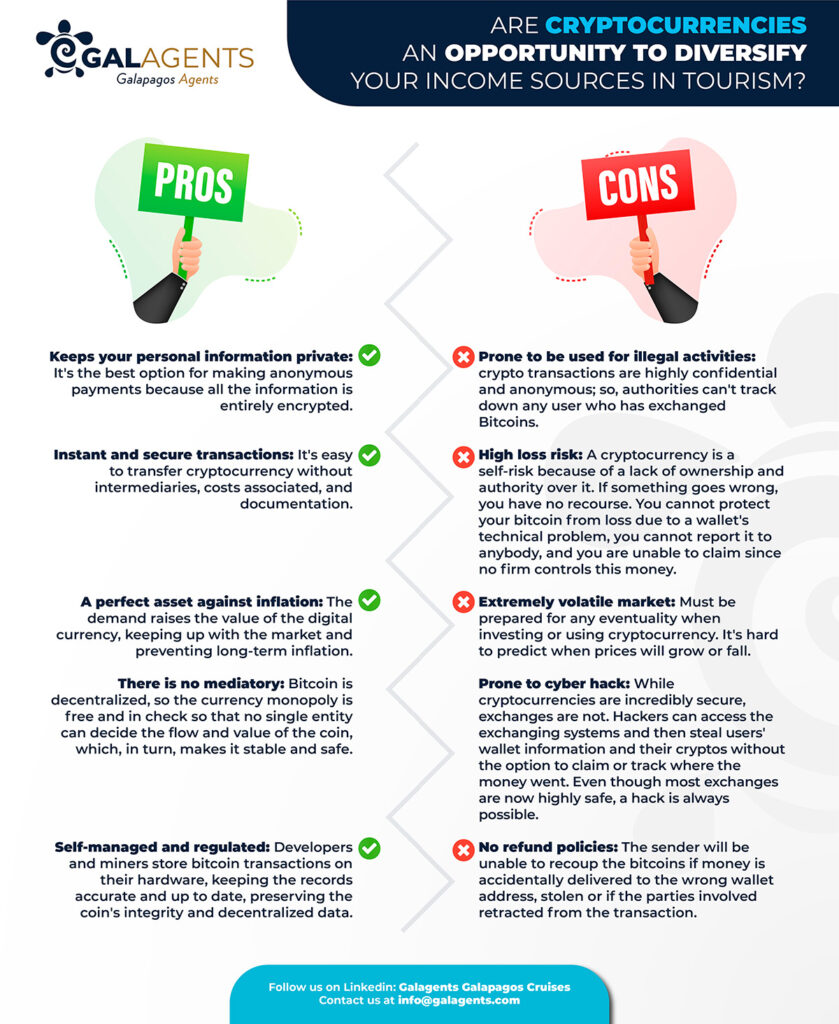In 2008 the world discovered that the financial system failed to oversee how banks invested their clients’ assets, looking only to maximize banking profits. Then, the global economy collapsed, affecting millions of people’s jobs and life savings. Therefore, in 2009 the pseudonymous Satoshi Nakamoto created Bitcoin – a blockchain network that functions as a peer-to-peer payment network away from the regular financial system. Nowadays, more than 7,000 cryptocurrencies and several platforms facilitate transactions with cryptos (Ledger.com).
You probably have that crypto evangelist friend who claims that Bitcoins are making people rich, and you should invest in them, aren’t you? If not, at least you may be a bit curious about it.
Digital currencies have been blinking the eye of many industries from the supply chain, manufacturing, retail, telecommunications, and more. In the case of the tour and travel industry, there are already some companies that accept cryptocurrency payments, like Expedia, Travala, CheapAir.com, and AirBaltic, as the first airline that accepts Bitcoins as a payment method. Yet, would you like to know if this trend is feasible for your tourism business as an opportunity to diversify your income sources? If so, keep reading because, hopefully, you can clear your mind about cryptos with this article.
Blockchain: The underpinning of cryptos
According to Investopedia, a blockchain is a shared ledger that stores data in blocks connected using encryption. So, as new data arrives, it is added to a new block. Once the block has been filled with data, it is chained onto the preceding block, putting the data in chronological sequence. Because decentralized blockchains are unchangeable, Bitcoin transactions are irreversible, forever recorded, and viewed by anybody.

Understanding the nodes: where everything begins
A Bitcoin node is any computer software that allows computers to download and store the entire Bitcoin blockchain, as well as verify and record new transactions as they occur. Thousands of worldwide nodes always check every new transaction against their current records and filter out any transactions attempting to fool the system or disobey the rules. And as the number of nodes increases, the records are kept on more computers, making it more difficult to cheat the entire system.
Mining codes to build cryptos
A miner is a specialized computer system that uses powerful processing resources to add new sets of transactions (read blocks) to the blockchain and produce new Bitcoins with each block. However, to add new transactions, you must first know what actions are required, so every miner must instead be a node capable of receiving and recording new transactions.
Which are the glitters and shadows of Bitcoins?
As with everything in life, there are pros and cons, as with cryptocurrencies. According to the World Financial Review, there are at least five reasons each, so let’s find them out.
The glitter
- Keeps your personal information private: It’s the best option for making anonymous payments because all the information is entirely encrypted (money, personal and payment info, etc.), and it will never be leaked.
- Instant and secure transactions: It’s easy to transfer cryptocurrency without intermediaries, costs associated, and documentation.
- A perfect asset against inflation: Almost every cryptocurrency has a finite amount from the beginning, i.e., creating 21M Bitcoins. Then the demand raises the value of the digital currency, keeping up with the market and preventing long-term inflation.
- There is no mediator: Bitcoin’s key benefit is that it is decentralized, so the currency monopoly is free and in check so that no single entity can decide the flow and value of the coin, which, in turn, makes it stable and safe.
- Self-managed and regulated: Developers and miners store bitcoin transactions on their hardware and receive a transaction fee as a reward for their work. So, they keep transaction records accurate and up to date, preserving the coin’s integrity and decentralized data.

The shadows
- Prone to be used for illegal activities: Because bitcoin transactions have a high level of confidentiality and anonymity, authorities can’t track down any user or maintain track of their data using their wallet address.
- High loss risk: A cryptocurrency is a self-risk because of a lack of ownership and authority over it. If something goes wrong, you have no recourse. You cannot protect your bitcoin from loss due to a wallet’s technical problem, you cannot report it to anybody, and you are unable to claim since no firm controls this money. So, if you select a wallet, make sure it has positive reviews and can be trusted. Another point to consider is your country’s existing cryptocurrency rules.
- Extremely volatile market: When investing in cryptocurrency, you must be prepared for any eventuality. It’s hard to predict when prices will grow or fall. You must be an experienced analyst and researcher and knowledgeable about bitcoin market news and trends.
- Prone to cyber hack: While cryptocurrencies are incredibly secure, exchanges are not. Most exchanging systems keep users’ wallet information to operate their user ID appropriately. Hackers can use this data to access a massive number of accounts, and then they can immediately withdraw funds from the owner’s accounts. It happened before that hackers have stolen hundreds of millions of dollars in bitcoins. Even though most exchanges are now highly safe, another hack is always possible.
- No refund policies: The sender will be unable to recoup the bitcoins if money is accidentally delivered to the wrong wallet address or if the parties involved retracted from the transaction. Because there are no returns, the only option people have is to claim that they never received the product or services paid with cryptocurrency.
Are you prepared to accept cryptos as a payment method?
After this brief overview of Bitcoins, it’s your time to analyze the convenience for your tourism business to diversify your income sources as well as open to a new market willing to transaction with cryptos to buy goods and services.
Take a conscious decision and avoid jumping into a trend without knowing what you’ll deal with.
Do you want more information about cryptocurrencies? Please check the following links to dive deeper into this crypto world:
- https://www.ibm.com/topics/what-is-blockchain
- https://worldfinancialreview.com/pros-and-cons-of-investing-in-cryptocurrency/
- https://www.ledger.com/academy/what-is-a-node-and-why-should-i-operate-one
- https://partners.playvisit.com/en/cryptocurrency-is-definitely-gaining-ground-in-the-travel-sector/
- https://www.tourismtiger.com/blog/tourism-crypto-industry/

